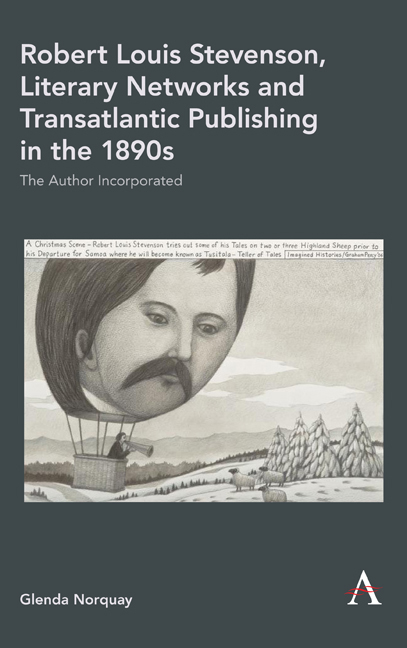 Robert Louis Stevenson, Literary Networks and Transatlantic Publishing in the 1890s
Robert Louis Stevenson, Literary Networks and Transatlantic Publishing in the 1890s Book contents
- Frontmatter
- Contents
- Acknowledgements
- Abbreviations
- Introduction
- 1 Lemuel Bangs: ‘The Senator’
- 2 A Tale of Two Texts
- 3 ‘A Gentleman Called Charles Baxter’
- 4 Sidney Colvin: Custodian and Monument
- 5 Family, Friends and Collaborators
- 6 Arthur Quiller-Couch: The Quivering Needle
- 7 Richard Le Gallienne: ‘Not While a Boy Still Whistles’
- Conclusion: Robert Louis Stevenson Incorporated
- References
- Index
7 - Richard Le Gallienne: ‘Not While a Boy Still Whistles’
Published online by Cambridge University Press: 16 February 2020
- Frontmatter
- Contents
- Acknowledgements
- Abbreviations
- Introduction
- 1 Lemuel Bangs: ‘The Senator’
- 2 A Tale of Two Texts
- 3 ‘A Gentleman Called Charles Baxter’
- 4 Sidney Colvin: Custodian and Monument
- 5 Family, Friends and Collaborators
- 6 Arthur Quiller-Couch: The Quivering Needle
- 7 Richard Le Gallienne: ‘Not While a Boy Still Whistles’
- Conclusion: Robert Louis Stevenson Incorporated
- References
- Index
Summary
The final tale of transatlantic transactions and incorporation of Stevenson is that of Richard Le Gallienne (1866– 1947). Critic, novelist, poet, decadent and aesthete of the fin-de-siècle, in some respects Le Gallienne appears even more distant from Stevenson than Quiller-Couch. Yet he too connects with the Stevensonian body, invoking the writer in spiritual communion, engaging in dialogue with his critical perspectives and referencing Stevenson's work in his own writing as part of the ongoing search for success in both Britain and the United States. The most obvious and romantic link between the two men is the place ‘RLS’ held in the imagination of the younger writer. This role as inspirational author was made more vivid by a real critical debate, important for both, underpinned by a shared interest in the mechanics and economics of writing. During Le Gallienne's complicated life he ventured into a range of genres and marketplaces: Stevenson again served him in surprising ways on this journey, incorporated into his own poetry and fiction. Le Gallienne’s long and itinerant literary life, which took him from Liverpool to the highculture circles of 1890s aestheticism in London, then across the Atlantic and back, represents a model of mobility – geographical and generic – akin to Stevenson's but revealingly different. His story, stretching from 1890s decadence into the twentieth century, caught in the new literary configurations that century brought, presents a sharp delineation of the cultural kinesis that surrounded Stevenson. In his critical writing Stevenson engaged with tensions between professionalism and creativity, popularity and art. In his fiction he contributed to new understandings of mobility and geography. But in person, in his last years, he resolutely turned away from the business of publishing which brought his work to international readers. Le Gallienne, himself part of the publishing milieu and with a rather more practical understanding of its mechanics, criss-crossing the Atlantic in search of artistic and financial success and dependent upon the vagaries of transatlantic taste, was forced into a rather harsher confrontation of changing worlds in publishing.
Velvet-coated poets were particularly appealing to Oscar Wilde acolyte Le Gaillenne, whose life as son of a brewery manager from Birkenhead had been transformed by hearing Wilde lecture in 1883. In his association with Wilde, John Lane and the Rhymers Club, and as a contributor to The Yellow Book, Le Gallienne moved in different circles to Stevenson's friends.
- Type
- Chapter
- Information
- Robert Louis Stevenson, Literary Networks and Transatlantic Publishing in the 1890sThe Author Incorporated, pp. 187 - 198Publisher: Anthem PressPrint publication year: 2020


